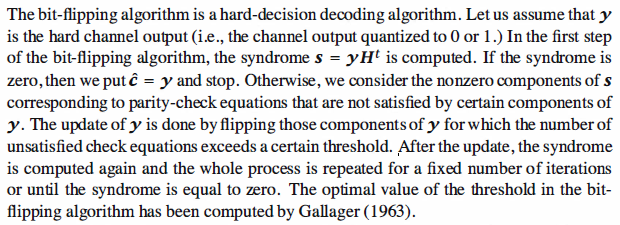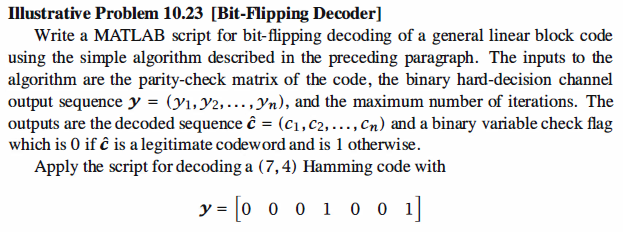Decoding LDPC Codes - The Bit-Flipping Algorithm
The bit-flipping algorithm is a hard-decision decoding algorithm with low complexity.

A modified, and much simpler, version of the bit-flipping algorithm is obtained by
flipping only those bits in y for which the number of unsatisfied parity check equations
has the largest value and then repeating the syndrome computation.
This process is continued until either the syndrome is zero or a predetermined number of iterations is reached.
Matlab Coding

1 function [c check] = bitflipping(H,y,max_it) 2 %BITFLIPPING Bit-flipping algorithm for decoding LDPC codes 3 % [c check] = bitflipping(H,y,max_it) 4 % H: parity-check matrix of the code 5 % y: channel outputs, binary-valued 6 % max_it: maximum number of iterations 7 % c: decoder output 8 % check: is 0 if c is a codeword and is 1 if c is not a codeword 9 10 s = mod(y*H',2); %Syndrome computation 11 it=1; %Iteration counter 12 while ((it<=max_it) && (nnz(s)~= 0)) 13 f = s*H; 14 ind = find(f-max(f) == 0); 15 y(ind) = mod(y(ind)+1,2); 16 it = it+1; 17 s = mod(y*H',2); 18 end 19 c = y; 20 check = nnz(s); 21 if (check > 0) 22 check = 1; 23 end
>> y = [0 0 0 1 0 0 1]
y =
0 0 0 1 0 0 1
>> H = [1 0 0 1 0 0 1]
H =
1 0 0 1 0 0 1
>> [c, Pcheck] = bitflipping(H,y,6)
c =
0 0 0 1 0 0 1
Pcheck =
0
Reference,
1. <<Contemporary Communication System using MATLAB>> - John G. Proakis